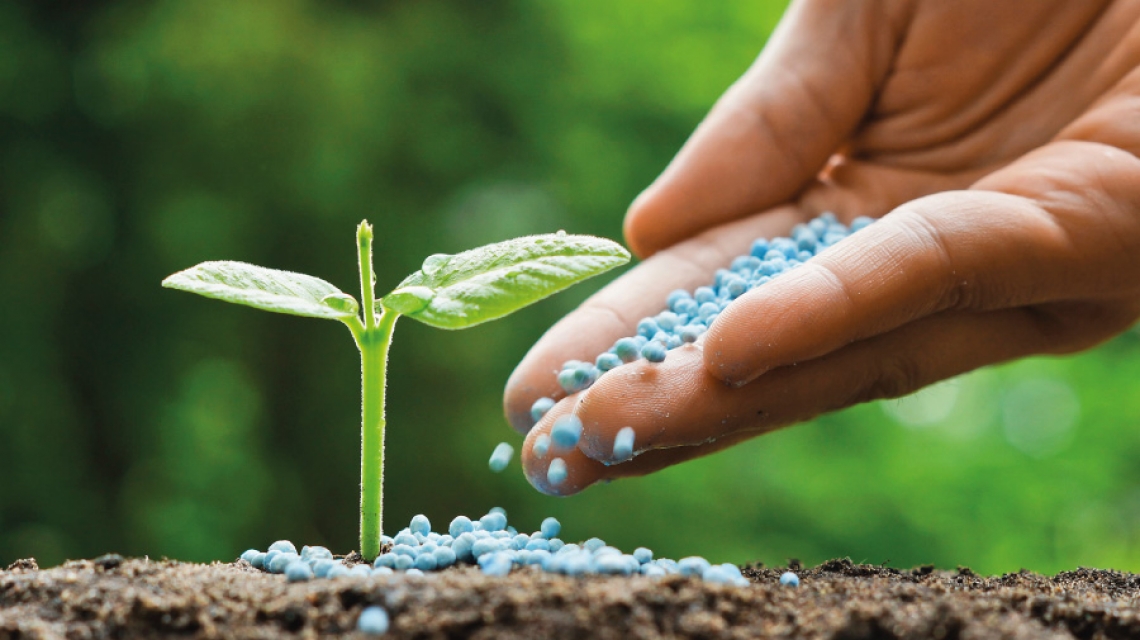
A novel innovation that can help address the country’s food, water and energy security concerns is being developed by Masdar Institute student Fatima Al Jallaf. Her soil fertility-enhancing biodegradable “microbeads” have the potential to improve the UAE’s ability to support farming.
In her research, which is being conducted through the Masdar Institute Center for Water and Environment (iWater), specific microbes will be attached to the microbeads, and once inserted in the ground, the microbes will spread through the soil and improve its ability to sustainably support crops.
“Microbial communities, like the ones we want to bring to UAE soils, need an environment to live in. This is the role of the microbead – like a housing community, it will contain all of the ‘amenities’ required for the microbes to thrive. When in the soil, the microbes will propagate in the beads and release important nutrients, which will diffuse out to the soil,” explained Dr. Hector Hernandez, Assistant Professor of Chemical Engineering and Advisor to Al Jallaf.
Fertility-enhancing microbeads have been developed before and have successfully been used in places like the state of Washington in the USA. However, that type of bead is not suitable for the UAE’s hot soils – they dry up and shrink within hours after being released into the soil.
“Healthy soil is teeming with millions of microorganisms who perform a variety of functions, such as removing toxins and storing carbon. The problem with the UAE’s desert soils is that they are largely devoid of carbon sources and these helpful microorganisms. We are trying to bring these growth-promoting bacteria into the soil with this microbead research,” Al Jallaf said.
The UAE has a long-standing focus on increasing its agricultural output for improved food security and economic diversity. But the country’s soil is not naturally conducive to agriculture, with its high sand and low nutrient content, making crop growth challenging and water-intensive. More than 70% of the UAE’s water use goes towards irrigation for agriculture although food imports still amount to between 85% and 90% of the UAE’s food consumption each year.
To help make the UAE’s soil far more supportive of agriculture, Al Jallaf is engineering specialized ‘“microbeads” that can slowly release nutrients into the extremely arid soils of the UAE. A microbead is a tiny plastic sphere – usually about 1 millimeter in size – that is commonly used in grooming products, like facial scrubs and toothpastes. Al Jallaf is looking to evolve the scope of microbeads by integrating them with fertility-boosting microbes. Microbes are an integral part of soils – serving to break down waste, aerate soil, enhance the water-use efficiency of crops and improve nutrient uptake.
“Soil plays a significant role in the food-water-energy nexus. The UAE’s soil requires a lot of water, which it gets through irrigation. And irrigation pumping consumes a lot of energy. By enhancing the soil’s ability to retain water and grow more crops through these microbeads, the country could potentially save a lot of water and energy and increase its domestic food production,” Al Jallaf added.
Al Jallaf and Dr. Hernandez are currently collaborating with Dr. Pance Naumov from NYU Abu Dhabi and his postdoctoral associate Dr. Lidon Zhang on identifying the base material best suited for the UAE’s harsh climate, and their research is promising. This collaborative effort has led to the development of a microbead based on the microbeads used in the US. This compound, sodium alginate – an organic substance with a thick consistency – is added to calcium chloride. It solidifies on contact to produce a round gel microbead. Al Jallaf and Dr. Zhang are in the process of fine-tuning the microbead formula to find the ideal microbead composition. They are hopeful that they will be able to develop a microbead that can stand up to the hot and dry UAE climate, so it can be dispersed in cropland to provide improved fertility and water conservation.
Al Jallaf believes that promoting healthier soils in this way can help the UAE produce more food, while significantly cutting water and energy consumption, leading to a stronger, sustainable and more profitable agricultural industry.
Although agricultural production in the UAE has increased considerably in recent years, it is currently a small component of the total GDP, representing only 3%. However, agriculture has been identified by the government as a key sector for the country’s economy. Additionally, with a stronger agricultural industry, the UAE will be able to rely less on food imports for certain products that can be grown efficiently in the UAE thus enhancing the UAE’s overall food security. With new technologies that support soil productivity, the UAE will be able to increase its crop production and enhance self-sufficiency.
Through its pursuit of cutting-edge innovations to enhance the UAE’s soil fertility, Masdar Institute demonstrates its commitment to finding real-world solutions to issues of sustainability relevant to the UAE. As can be seen by the innovative work of Al Jallaf, Masdar Institute continues to develop UAE’s local human and knowledge capital, ultimately contributing to the UAE’s burgeoning competitive, knowledge economy.
Erica Solomon
News and Features Writer
16 August 2015